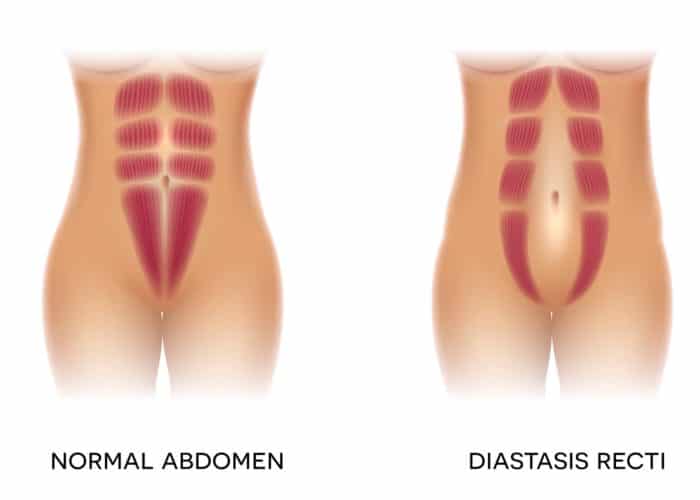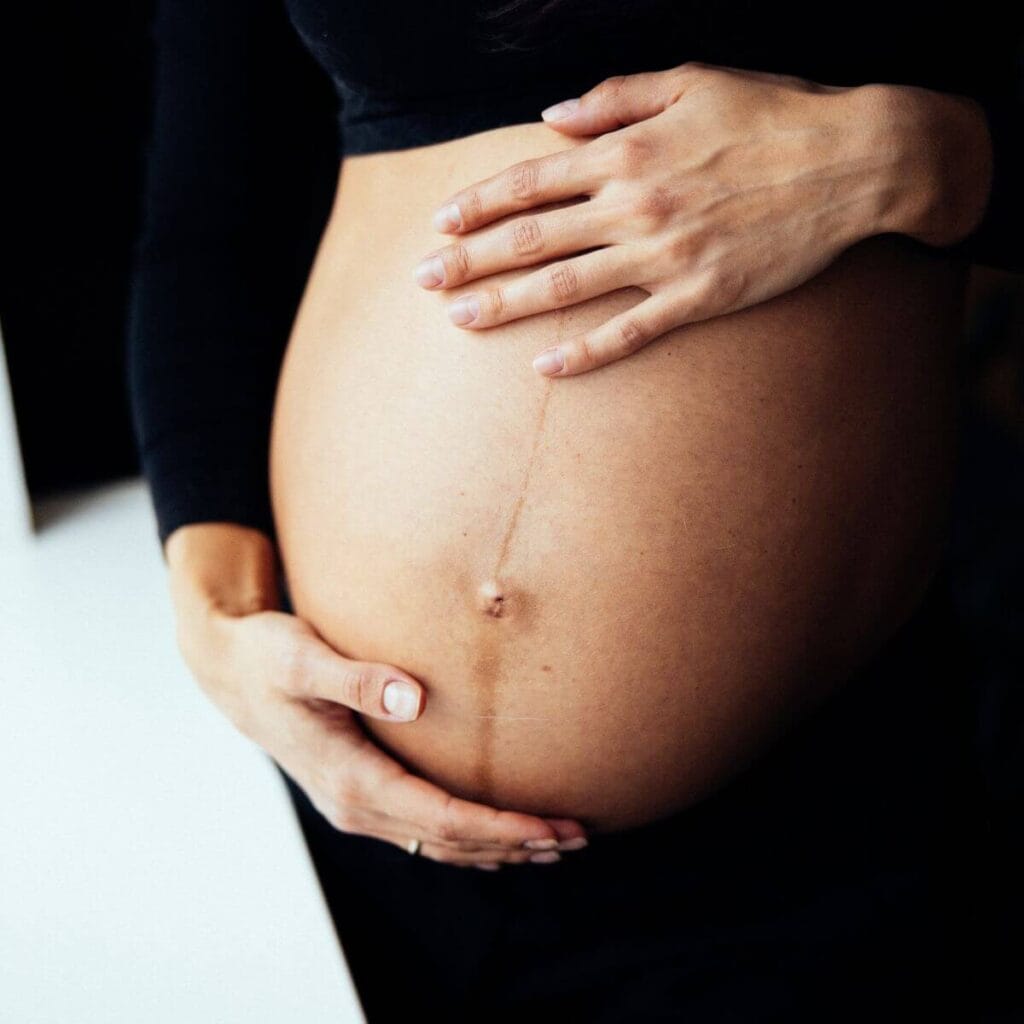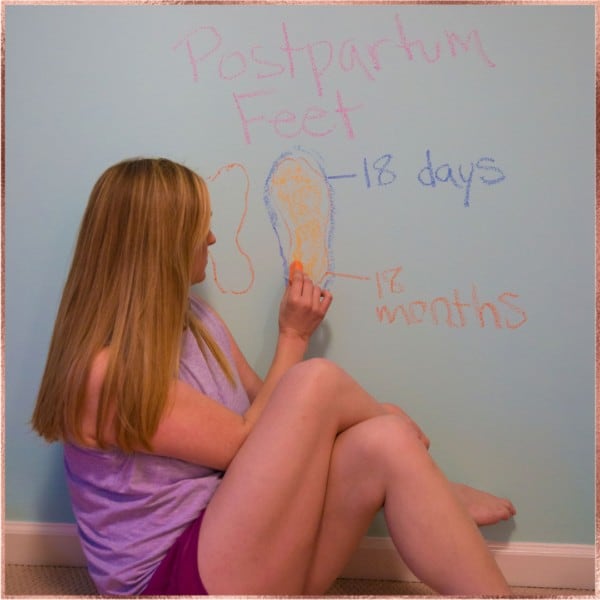The first moment I experienced lightning crotch (more on that soon), I nearly fell to the floor in pain. I was changing pants sometime during my second trimester, and boom–it was like an electric shock hit the left side of my vagina. Honestly, I had NO clue what was going on down there, and it scared the hell out of me (and it really hurt). I was so mad that no one had told me about things like this, OR about weird things that can happen during pregnancy in general!
As someone who struggled through recurrent miscarriage, “weird” things that happen during pregnancy were incredibly anxiety-inducing for me. I felt like my body was beyond my control, and people who struggle with anxiety usually crave feeling in control.
I had done all the research on what should happen in each trimester of pregnancy, what prenatal vitamins to take, and how my baby should be developing at each stage. But I hadn’t come across anything about many of the weird things that could happen to my body. It would’ve saved me a lot of worry if someone had just told me about these things!
That’s why I’m sharing 14 weird things that happen during pregnancy that no one told you.
These pregnancy conditions aren’t going to rain down on you all at once, but at least a few of them are very likely to happen to you during your 40-ish weeks. And when they do, you can feel prepared and knowledgeable, not terrified like I did.
A huge thanks to Fairhaven Health for sponsoring this article. Fairhaven Health provides science-based products for your journey to parenthood–from fertility through pregnancy, breastfeeding, and beyond. Their support has allowed me to deep dive into many of the conditions that plagued me during my own pregnancies, as well as many other symptoms that other moms regularly experience. I’m so thankful for Fairhaven’s products that supported me during my own fertility, pregnancy, and breastfeeding journeys.

This site contains affiliate links, meaning that we earn a small commission for purchases made through our site. We only recommend products we personally use, love, or have thoroughly vetted.
- 14 Weird Things That Happen During Pregnancy
- 1. Lightning Crotch
- 2. Weakened Immune System
- 3. Round Ligament Pain
- 4. Diastasis Recti
- 5. Allergies
- 6. Your Perineum Can Benefit From a Massage
- 7. Linea Nigra
- 8. Pregnancy Brain (Momnesia)
- 9. Stronger Hair and Nails
- 10. Weaker Teeth
- 11. Bigger Feet
- 12. Loose Joints
- 13. Blue Vagina
- 14. Increased Blood Volume
- Your Pregnant Body Is AMAZING
14 Weird Things That Happen During Pregnancy
First off, if you’re having trouble with any of the following conditions, I’m so sorry! I know how annoying and frustrating many of them can be. But the good news is that very few (if any) are life-threatening to you or your baby.
While they might feel life-threatening, most of the symptoms we’re about to get into last for only a short period of time. As always, though, you should talk to your doctor when you have any kind of problem or question during your pregnancy.
Alright, let’s get into some weird pregnant body stuff!
1. Lightning Crotch
Simply put, lightning crotch is a sudden, sharp pain deep in your vagina that rivals anything I’ve ever experienced. Kidney stones and childbirth were worse, but only because they lasted so much longer.
This stabbing vaginal pain occurs in the pelvic area during pregnancy. It’s fiery, seriously like an electric shock rapidly bolting through your body and then immediately out of it.
Lightning crotch comes and goes like a bolt of lightning–suddenly and intensely, without warning, and then gone.
The good news is, unlike many other pregnancy aches and pains, lightning crotch comes and goes in seconds, and you’re most likely to experience it during the third trimester when you also have round ligament pain (more on this soon).
We may not be certain about what causes lightning crotch, but we do know this. Lightning crotch pain is nothing to worry about (unless it doesn’t go away; then you should see a doctor immediately), even though the shocking pain of it can be enough to make you want to unleash a stream of profanity (no judgment here).
2. Weakened Immune System
Did you know that you’re more likely to get sick during early pregnancy when the immune system treads a careful line between preserving your health and preventing rejection of the developing fetus?
Early in your pregnancy, the fetus is technically a foreign entity. This makes pregnancy sound a bit like housing an alien, doesn’t it?
In fact, Stanford researchers have found that a pregnant person has a unique immunological clock that can actually predict preterm labor. Basically, you can set your nine-month watch by the waning of your immune system in early pregnancy and then the restoration of it closer to the time you give birth.
But here’s the kicker: this immune adaptation can make pregnant people somewhat more susceptible to certain infections, particularly in early pregnancy. So, it’s crucial for you to take extra care of your health and stay up-to-date with vaccinations that are recommended during pregnancy.
3. Round Ligament Pain
If you’ve never heard of round ligament pain, you’re not the only one! I had no clue what a round ligament was until pregnancy. It typically doesn’t occur until the first trimester, but it was actually my first pregnancy symptoms–maybe my body just produces too much relaxin? I found myself frantically googling to see what the pain in my abdomen was every time I coughed, sneezed, or moved wrong.
Round Ligaments are basically the ligaments that connect the uterus to the pelvis. They are each about 10-12 centimeters long, and as the baby grows in the uterus, they stretch. This stretching can cause a sharp pulling (spasm) and/or aching sensation.
Round ligament pain typically occurs in the second trimester of pregnancy as the baby develops and your body gets ready for birth by releasing a hormone called relaxin that makes your joints and ligaments stretch.
Round ligament pain is quite common and normal, and there are several things you can do for it, such as:
- belly bands (my favorite is the PT-designed Pro-Bump by BaoBei; get 15% off with code undefiningmotherhood);
- changing positions,
- gentle stretching,
- and avoiding sudden movement.
And while it can be a pain in your side (literally), it doesn’t cause harm to you or your baby.
However, abdominal pain during pregnancy can be a sign of something more serious. If you have what you think is round ligament pain accompanied by any of the following symptoms outlined by The Cleveland Clinic, you should call your doctor immediately:
- Bleeding,
- Contractions,
- Chills,
- Fever,
- Lightheadedness,
- Nausea or vomiting not related to morning sickness,
- Pain or pressure in the lower back, another sign of labor,
- Severe pain that doesn’t go away,
- Trouble walking,
- Vaginal discharge.
4. Diastasis Recti
Diastasis recti is probably one of the more common pregnancy (and postpartum) conditions on this list. If you know a mom or two, you’ve likely heard them complain of how weak their core is during pregnancy and the postpartum period. But what many people don’t know is that it’s due to the separation of the abdominal muscles (specifically the rectus abdominis muscles) along the midline of the abdomen, also known as Diastasis recti.
This happens because of the expanding uterus during pregnancy, which can put significant pressure on the abdominal wall. As a result, the connective tissue between the muscles becomes thinner and stretched, leading to a gap between the two muscle bellies.

According to the Cleveland Clinic, diastasis recti affects 60% of people during pregnancy and postpartum. The good news is that for most people, it resolves itself after 8 weeks of delivery, and only 40% of people who have diastasis recti during pregnancy will have it after 6 months of giving birth.
Try not to worry too much, though (I know, easier said than done)! For most pregnant folks, the separation is mild and resolves naturally within the first few months after giving birth, especially with appropriate postpartum exercises, such as these, which are suggested by the National Academy of Sports Medicine (NASM).
If you’re looking for an exercise regimen to support your abdomen, we love the ones by Expecting & Empowered.
5. Allergies
Hormonal shifts during pregnancy can affect the immune system making you more sensitive to allergens like pollen, pet dander, or dust mites. It’s like your body turns into an allergy detective, sniffing out every tiny irritant around you in order to protect you and your baby. Technically, this weird thing that happens during pregnancy is doing you a favor, but it probably doesn’t feel like it!
For those who already had allergies before pregnancy, you’re more likely to experience the sniffles while pregnant (so sorry, mama).
If you find yourself dealing with unexpected allergies while expecting (or more allergies than usual), keep in mind that it’s a normal part of the journey even if it’s annoying as all hell.
Have some tissues and pregnancy cold medications on hand, and don’t hesitate to reach out to your healthcare provider if you need advice on managing your allergies. Even while pregnant, you don’t have to suffer without meds! There are pregnancy-safe options available.
6. Your Perineum Can Benefit From a Massage
Okay, so this one isn’t as much one of the weird things that can happen during pregnancy as it is just something that I need you to know/do. You’ve probably heard horror stories about perineal tears during birth or maybe you’ve even heard tell of the misogynistic practice of the husband stitch.
Perineal tears happen when the area between your anus and vulva is torn during vaginal childbirth, and there are multiple degrees of tearing that can happen.
What if I told you that you could reduce your risk of vaginal tearing during delivery in 5 minutes a day during the weeks leading up to birth?
According to recent research, most vaginal births are associated with trauma to the perineum. In fact, 4 to 8 out of every 10 births result in a vaginal tear, with roughly 2/3 of women who tear requiring stitches. It doesn’t have to be this way.
The good news is that research suggests that perineal massage reduces the risk of perineal trauma, as well as ongoing pain after delivery.
Perineal massage is a great way to avoid the potential trauma of tearing during childbirth, and it’s relatively easy to do! And if you need a full tutorial, this video gives an extensive overview of perineal massage without making it awkward!
We highly recommend using Fairhaven Health’s BabyIt Perineal Massage and Postpartum Recovery Gel while practicing perineal massage and for postpartum aftercare.
Using BabyIt can make perineal massage more comfortable and help to hydrate perineal tissues so they remain soft and supple.
7. Linea Nigra
Have you ever seen a photo of a pregnant person’s belly and wondered what the dark line running down from their belly button was? That darker line is called “linea nigra.”
The linea nigra runs vertically from the belly button downwards. This phenomenon occurs due to increased melanin production in the skin, which is caused by hormonal changes during pregnancy.

While it might seem unusual, it’s entirely normal and quite common! In fact, 80% of pregnant folks get one in the second trimester when hormone levels are higher, but it can be darker or lighter according to your melanin levels.
The good news is that the linea nigra is temporary. After giving birth, and as your hormones settle down, the line gradually fades away. So, there’s no need to worry about it sticking around forever. It’s just a natural part of the changes your body goes through during pregnancy.
8. Pregnancy Brain (Momnesia)
If you find yourself suddenly feeling more forgetful than normal during pregnancy, you’re not alone, and you’re not going nuts! Did you know that “pregnancy brain,” aka “momnesia,” is one of the weird things that happen during pregnancy (and after)??
During pregnancy, hormonal changes, particularly increased estrogen and progesterone levels, can impact cognitive function. This can lead to symptoms commonly referred to as “mom brain,” which is characterized by forgetfulness, difficulty concentrating, and feeling mentally foggy.
Researchers believe that these cognitive changes may be a result of hormonal fluctuations that actually prepare you for the challenges of being a parent. The brain may prioritize certain tasks, such as focusing on the baby’s needs and environment, while allocating mental resources differently.
This reorganization of cognitive functions can temporarily lead to declines in memory, and it can also make it more difficult to start or engage in tasks. So if you’re feeling more scattered, overwhelmed, and disoriented than usual, this is actually a “normal” thing.
The phenomenon of “mom brain,” “pregnancy brain,” or “momnesia” is generally considered a common part of pregnancy and early parenthood, but that doesn’t mean that it isn’t incredibly frustrating! After childbirth, as hormone levels gradually stabilize, many people report a return to their pre-pregnancy cognitive abilities after two years. Though if I’m being honest, I’m still waiting.
9. Stronger Hair and Nails
At this point in the lineup of weird things that happen during pregnancy that no one told you about, you’re probably wondering if there’s anything good that will happen to you (besides a baby, of course!) during this pregnancy journey.
There is! Along with that pregnancy glow, you may notice a delightful side effect: stronger and thicker hair and nails.
During pregnancy, your body becomes a powerhouse of hormones, and some of these hormonal changes work wonders for your hair and nails. One superstar in this lineup is estrogen. It increases blood circulation, delivering more nutrients and oxygen to your hair follicles and nail beds, giving them that extra boost they need to really impress your hairdresser or nail technician.
Another hormone lending a helping hand is progesterone. It plays a role in stimulating the growth of your hair by prolonging the growth phase, which makes your hair feel thicker and fuller.
Plus, increased progesterone levels also reduce hair shedding, giving you a break from finding your hair literally everywhere!
As for your nails, the same hormonal tag team works its magic by enhancing keratin production, the protein responsible for nail strength and growth. In fact, many women report that their nails grow faster and stronger during pregnancy.
Keep in mind, though, that this hair and nail makeover is an effect of pregnancy and isn’t likely to last during the postpartum period, when many people actually experience quite a bit of hair shedding, best known as postpartum hair loss.
10. Weaker Teeth
Even though your hair and nails may look better than they ever have, you’ll need to pay special attention to your mouth as pregnancy can potentially have an impact on your teeth and oral health.
It’s not that pregnancy directly weakens your teeth, but rather the hormonal changes and shifts in your body during this time can contribute to dental issues.
Elevated estrogen levels can make your gums more sensitive to plaque, leading to an increased risk of gingivitis (gum inflammation). This condition, if left untreated, can progress to more severe gum disease, known as periodontitis, which may eventually impact your teeth and jawbone.
Also, morning sickness, a common pregnancy symptom, can also play a role in dental health. Frequent vomiting exposes your teeth to stomach acid, which can erode tooth enamel over time, making them more susceptible to decay and sensitivity.
And that extreme sweet tooth you’ve developed since getting pregnant? You might want to cut down on that (please don’t hate me!). Cravings for sugary or acidic foods and aversions to certain healthier options can impact your dental health if you’re not careful, especially in the third trimester when you’re more susceptible to gingivitis and bleeding gums.
To combat all these mouth issues during pregnancy, it’s really important to maintain regular dental check-ups (tell your dentist you’re pregnant!) and practice good oral hygiene habits, such as brushing twice a day, flossing daily, and using fluoride toothpaste. My dentist had me switch to an electric toothbrush, and it helped a ton.
11. Bigger Feet
By now you’ve probably realized that your hormones are at play for pretty much everything on this list! Bigger feet are no exception, my friend.
So what makes your feet grow during pregnancy? The increased hormone levels during pregnancy, particularly relaxin and progesterone, play a role in causing the ligaments in the feet to relax and stretch.
This, combined with the added weight and pressure from your growing baby, can lead to a flattening of the feet (particularly the arches) and a slight increase in shoe size.

Additionally, the natural weight gain during pregnancy can contribute to foot swelling and can make you feel like your feet are twice their normal size. After childbirth and as your hormone levels return to normal, your feet won’t be as swollen, but there is a chance that they will remain bigger.
12. Loose Joints
It’s probably no surprise that this one is directly related to the bigger/flatter feet thing. Relaxin, the same hormone that stretches your feet out, will also make you more flexible in order to prepare your pelvis for birth.
The body produces relaxin during your normal menstrual cycle. It actually helps with implantation of the embryo, and if implantation occurs, it helps with the growth of the placenta. Cool, huh?
This same hormone that helps grow your placenta also helps make you super stretchy and ready for birth by softening your pelvis (thank goodness for relaxin, honestly). As it does so, it also stretches other joints in the body, so don’t be surprised if you feel extra bendy during pregnancy!
13. Blue Vagina
Alright, friend, I’m going to give it to you straight: while completely painless, this one might be the weirdest thing on this whole list. If you happen to look down in early pregnancy and notice that your vulva has turned a bluish or purplish color, this is called “Chadwick’s Sign.”
Before you go thinking that your pregnancy is going to turn you completely into a freak of nature, you need to understand that Chadwick’s sign is actually a good thing! The color change happens because of increased blood flow to your reproductive organs caused by hormones in early pregnancy.
Not everyone experiences this seemingly weird early pregnancy symptom, but if you do, you’ll probably notice it 6-8 weeks from conception. It’s also absolutely nothing to worry about unless you’re experiencing pain along with it (in which case, always consult with your healthcare team).
It just means that your body is busy supplying more blood flow to your baby–kinda neat, huh?
14. Increased Blood Volume
Okay, we’re about to end on another weird, yet cool note: the blood volume in your body actually increases by quite a bit when you are pregnant! In fact, maternal blood volume increases by 45% when you’re pregnant!
By the third trimester, your blood volume will have increased by 50-60% in order to carry oxygen and nutrients to the baby.
This extra blood volume is crucial, but it can put some strain on your heart and other organs, so it’s essential to take care of yourself during pregnancy. Regular prenatal check-ups, a balanced diet, and proper rest are all part of the recipe for a healthy pregnancy.
Your healthcare provider should also keep an eye on your blood volume and overall health, making sure you and your baby are in good hands throughout your pregnancy.
Your Pregnant Body Is AMAZING
You might have found yourself scrolling through this list with your chin on the floor, and you’re certainly not the only one. Chadwick’s sign was honestly something I’ve never heard of before, even though I’ve experienced both lightning crotch and pregnancy brain.
And I WISH someone had told me about perineal massage and BabyIt with my first child because I had such an easier time after perineal massage with my second!
Basically, all of these are things I wish someone had explained to me clearly and thoroughly. I hope this list does that for you, mama!
Please keep in mind that these “weird” things that happen during pregnancy are actually physiological conditions that present in your body as it gets ready for your baby (or babies!). None of them are necessarily worrisome, although we can’t stress enough that if you’re uncomfortable or scared, PLEASE don’t be afraid to talk to your doctor or midwife!
Have you experienced any of these weird things that happen during pregnancy that no one told you about? Are we missing any?











